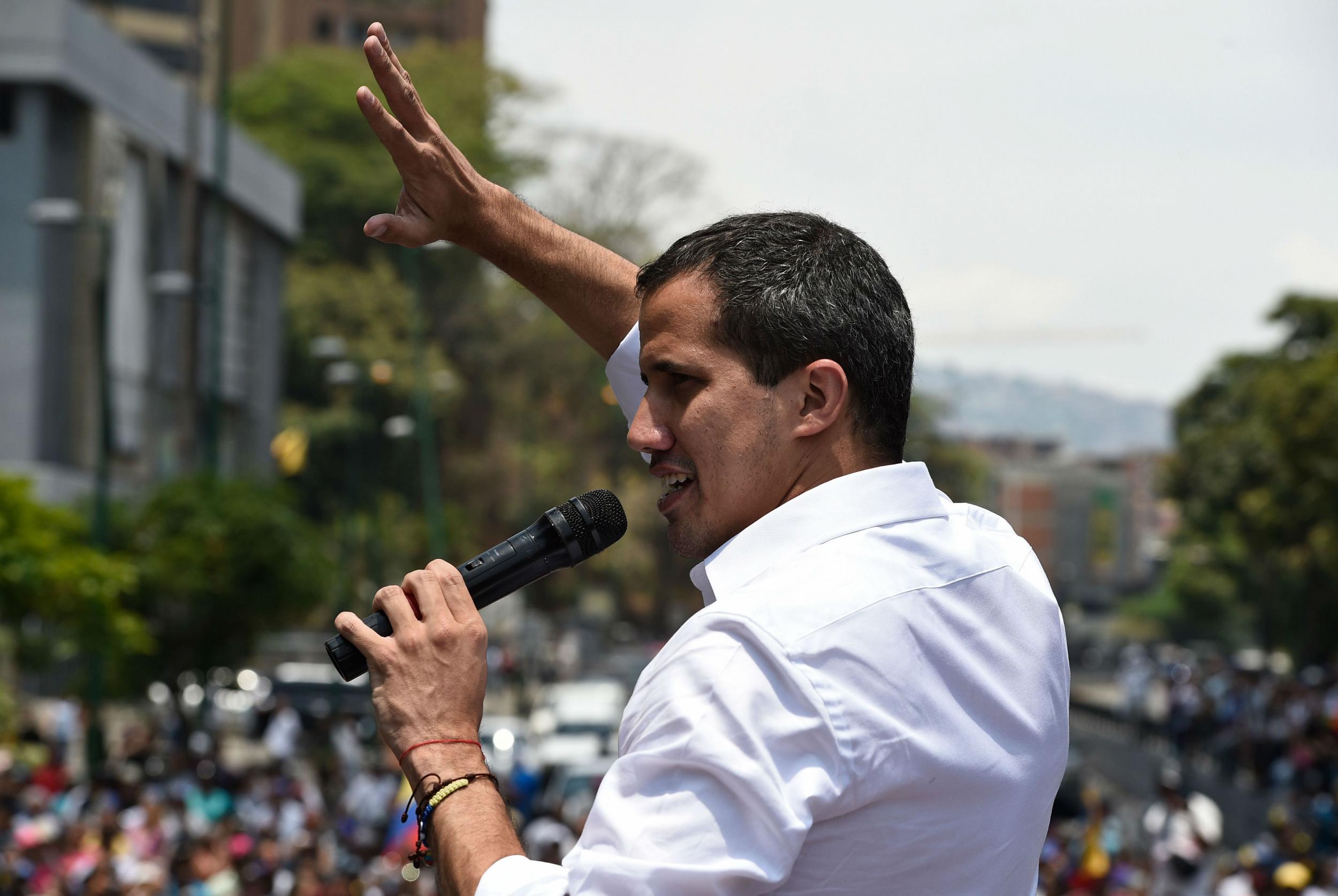Venezuela crisis: Duelling protests grip Caracas as Russia warns US military action 'fraught with gravest consequences'
Mike Pompeo says 'military action is possible if that's what’s required'
Rival groups of protesters have swept on to the streets of Caracas, as Russia warned the US that any aggressive steps by Washington would be “fraught with the gravest consequences”.
A day after opposition leader Juan Guaido rallied demonstrators against Nicolas Maduro, saying they were entering the final stages of their effort to oust the nation’s president, he again appeared before supporters promising victory.
“If the regime thought we had reached maximum pressure, they cannot even imagine,” he told cheering supporters in eastern Caracas. “We have to remain in the streets.”
But as on Tuesday, the opposition protests once again did not appear to likely to unseat Mr Maduro, whose supporters also filled the streets in their thousands on May Day, and promised to defend his government.
“Today the Venezuelan working class is mobilising throughout the country to celebrate its day and defend its achievements, with a great march that will say NO to the coups and NOT to the Yankee interference,” tweeted Mr Maduro. “Nerves of steel, calm and sanity. Long live the workers of the fatherland.”
Both Mr Maduro and his predecessor Hugo Chavez, who inspired a popular movement, relied on the support of Cuba.
Cuban doctors filled the clinics established by Chavez for the poor, and Cuban military advisors and intelligence officials bolstered the nation’s security apparatus. More recently, troops from Russia arrived in Venezuela in support of Mr Maduro.
On Tuesday, Donald Trump threatened to impose a complete embargo on Cuba if its troops did leave. “Hopefully, all Cuban soldiers will promptly and peacefully return to their island,” he tweeted.
On Wednesday, Mr Trump’s secretary of state Mike Pompeo told Fox News the US was determined to see Mr Maduro depart and be replaced by Mr Guaido, who earlier this year declared himself president.
He said: “Military action is possible. If that’s what’s required, that’s what the United States will do.”

The comments were quickly seized on by Russia, which warned the US not to become more directly involved in events in Venezuela, a situation that has rapidly turned into a proxy contest between Washington and Moscow.
Russian foreign minister Sergei Lavrov told Mr Pompeo by phone on Wednesday that further “aggressive steps in Venezuela would be fraught with the gravest consequences”. Mr Lavrov also condemned US “interference” in Venezuela’s internal affairs as a breach of international law.
In turn, the US has told Russia to keep its nose out.
“This is our hemisphere,” national security advisor John Bolton told reporters in Washington DC. “It’s not where the Russians ought to be interfering. This is a mistake on their part. It’s not going to lead to an improvement of relations.”
On Tuesday, around 100 people were injured in clashes between supporters of Mr Guaido and the security forces. At one point, an armoured vehicle was seen driving into a group of demonstrators.
In Cuba, where millions of people marched on Wednesday against US sanctions, officials denied its troops were in Venezuela. It said, however, that it maintained the right to pursue military and intelligence cooperation with its regional ally.
Carlos Fernandez de Cossio, Cuba’s director-general of US affairs, told the Associated Press the US had falsely accused his country of having more than 20,000 troops and intelligence agents in Venezuela.
“There are no troops,” he said. “Cuba does not participate in military operations nor in security operations in Venezuela.”
The protests in Venezuela have worsened a situation already desperately difficult as a result of shortage of food and medicine, power outages and political uncertainty. US sanctions on the oil industry have also hit the country hard.
Mr Guaido declared himself president 10 days after Mr Maduro was sworn in for a second term.
Mr Maduro was re-elected last year in an election boycotted by much of the opposition and which was not recognised by many western nations. A number of independent observers said it was fair.
Additional reporting by agencies
Join our commenting forum
Join thought-provoking conversations, follow other Independent readers and see their replies
Comments